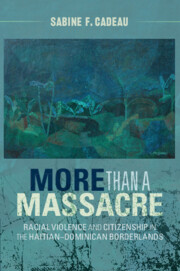Book contents
- More than a Massacre
- Afro-Latin America
- More than a Massacre
- Copyright page
- Dedication
- Contents
- Figures
- Maps
- Tables
- Acknowledgements
- Abbreviations
- Maps
- Introduction
- 1 From Natives to Foreigners
- 2 The End of the Old Border
- 3 Curses, Scuffles, and Public Disturbances
- 4 “They killed my entire family”
- 5 La campaña contra los Haitianos
- 6 The “Dominicanization” of the Border
- 7 Refugees and Land Conflict in the Postgenocide Haitian–Dominican Border Region
- Epilogue: The Right to Have Rights
- Appendix: Photographs
- Bibliography
- Index
Epilogue: The Right to Have Rights
Migration, Race, and Citizenship in the Dominican Republic
Published online by Cambridge University Press: 02 June 2022
- More than a Massacre
- Afro-Latin America
- More than a Massacre
- Copyright page
- Dedication
- Contents
- Figures
- Maps
- Tables
- Acknowledgements
- Abbreviations
- Maps
- Introduction
- 1 From Natives to Foreigners
- 2 The End of the Old Border
- 3 Curses, Scuffles, and Public Disturbances
- 4 “They killed my entire family”
- 5 La campaña contra los Haitianos
- 6 The “Dominicanization” of the Border
- 7 Refugees and Land Conflict in the Postgenocide Haitian–Dominican Border Region
- Epilogue: The Right to Have Rights
- Appendix: Photographs
- Bibliography
- Index
Summary
Executive Order 372 and its repressive application to Dominican-born people of Haitian ethnicity remains an essential historical point of reference for understanding ongoing debates over race and citizenship in the present-day Dominican Republic. On September 23, 2013, the Dominican Republic’s Constitutional Court passed judgement 168-13. This ruling established that all persons born since 1929 to immigrants in the Dominican Republic are not citizens of the country due to the fact that their parents were persons “in transit.” This particular language “in transit” has been at the crux of the legal polemics around what in the Dominican context has been known as the tema haitiano or the Haitian question. Migrants who came to the Dominican Republic from Haiti to work on sugar plantations arrived as temporary workers but frequently settled and established families in Dominican territory. Prior to the new 2010 constitution, Dominican constitutions had determined citizenship on the principle of jus soli instead of jus sanguini. Over the course of multiple decades, thousands of children of Haitian migrants had managed to obtain papers and become citizens. By turning to the constitutional language about persons “in transit” and applying this retroactively to people born on Dominican territory before 2010, the nation’s highest court reversed people’s citizenship and rendered stateless tens of thousands of ethnic Haitians. Interestingly the use of 1929, the year of a final border treaty between Haitian and the Dominican Republic concluded while Haiti was still under American occupation, draws attention back to the decades explored in the preceding chapters when the hard geographical and social border between the two nation-states was first established.
- Type
- Chapter
- Information
- More than a MassacreRacial Violence and Citizenship in the Haitian–Dominican Borderlands, pp. 255 - 270Publisher: Cambridge University PressPrint publication year: 2022



